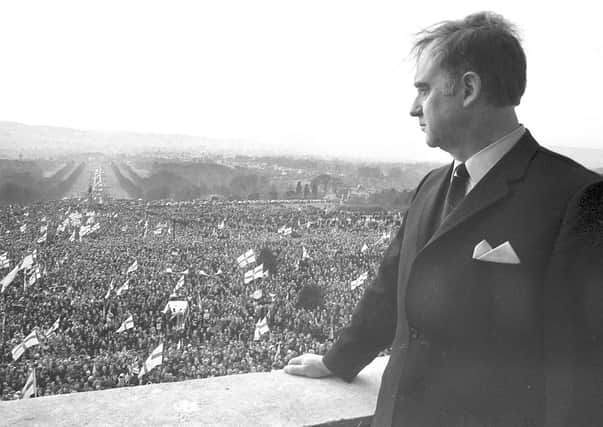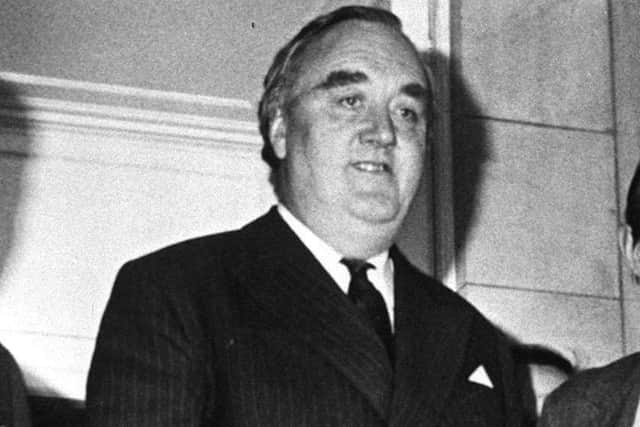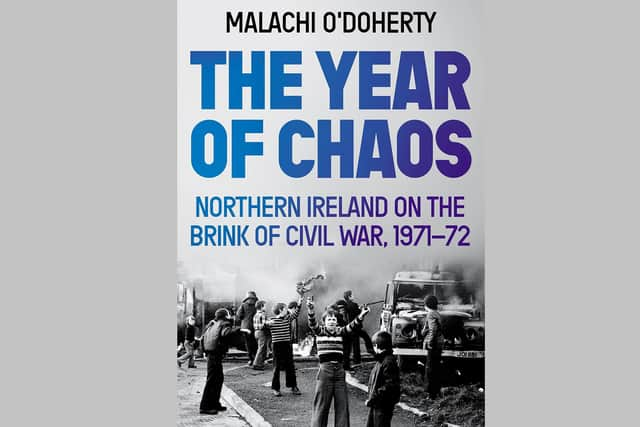Malachi O’Doherty book extract: Stormont is unlikely to be back, Ireland’s foreign minister was told by William Whitelaw in 1972


(This was published in our Monday print newspaper. A link to the previous extract we published from the book is below)
The Irish government was elated by the collapse of Stormont in March 1972 and now turned its immediate attention to working on the British to persuade them to set a united Ireland as the goal of their policy.
Advertisement
Hide AdAdvertisement
Hide AdAn advisory paper compiled for the department of foreign affairs in Dublin set out the reasoning behind this. The paper was called Towards a general settlement? and was marked ‘Secret’.


The paper contests the British claim that Ireland could not be united without the consent of a majority in the North: ‘The Taoiseach has said that the unionist population in Northern Ireland do not form a majority in UK or in Irish terms.
‘Nevertheless Faulkner, Craig and others are spokesmen for the idea that unionists, because they are a majority in Northern Ireland, are entitled to a determinant voice on British policy in regard to Northern Ireland.’
The paper argued that the British parliament, at which unionists were represented, had the authority to end the Union.
Advertisement
Hide AdAdvertisement
Hide AdIt then went on to argue that though, in principle, the unionists should not have a veto, it made sense to win some of them over to the idea of a united Ireland. ‘But there are many kinds of persuasion, besides intellectual argument, without running close to “persuasion” by bomb and bullet.’


Cardinal Conway, the primate of all Ireland, had said that the IRA was wrong to think it could ‘bomb a million Protestants into a united Ireland’.
The paper viewed that statement as ‘unfortunate’ because ‘it assumes that all Protestants in Northern Ireland are against the idea of a united Ireland’. However, at this stage the Irish were working on the parallel assumption that all northern catholics did want a united Ireland.
The taoiseach should now assert that Irish policy was ‘to change the constitutional status of Northern Ireland altogether’. The paper said, ‘That is not conquest, not assimilation, not victory. It is a constitutional reform which history imposes on the country as a whole.’
So how was it to be done?


Advertisement
Hide AdAdvertisement
Hide Ad‘The first requirement of a successful beginning of the disengagement of Britain from Ireland is that Britain should decide, in her own interest, that she should encourage Irish unity.’
The paper advised that unionists themselves in the North had no incentive to change their thinking other than ‘the refusal of the minority to behave, a potential demographic change in the future and the possibility that Britain will get fed up carrying the Northern state on its back’.
Government policy now should be to work on the British to help them see it as in their own interest to tell the unionists that partition could not endure forever.
The advisory paper emphasised that Irish unity was an objective of Irish government policy already. ‘… not unity eventually nor unity ultimately… If unity were to become available immediately the government would be bound to take it with whatever stresses might result.’
Advertisement
Hide AdAdvertisement
Hide AdThe first application of that strategy came when the minister for foreign affairs, Patrick Hillery, a future Irish president, met with the new Northern Ireland secretary of state William Whitelaw at the end of April.
He practically badgered Whitelaw into accepting that the ultimate goal of his new political initiative must be a united Ireland.
Heath in cabinet had emphasised the need to protect the position of Taoiseach Jack Lynch but the British were now facing as emphatic a thrust for a united Ireland as they might have expected from republican hardliners who would replace Lynch if he fell.
The two men chatted about what a lovely city Derry was. Whitelaw had made a visit there.
Advertisement
Hide AdAdvertisement
Hide AdGetting down to business, Whitelaw said an immediate priority was to assuage the wrath of extreme unionism. Massive protests had turned out against direct rule. He told Hillery that he believed that William Craig’s Vanguard movement was armed, though he believed that Craig would not order violence.
Whitelaw said that he would lift the ban on marches retroactively to the previous December. Those who had taken part in the Bloody Sunday and Newry marches would no longer be regarded as having broken the law. And he would continue with the release of internees. He had already closed the Maidstone prison ship and moved the internees by helicopter to Long Kesh.
He anticipated that releasing internees would get more difficult when he reached the ‘hard core’ cases which caused him considerable anxiety.
He had released one senior IRA man, Sean Keenan from Derry. One month before this meeting Sean Keenan’s nineteen-year-old son Colm had been shot dead by soldiers in Derry alongside nineteen-year-old Eugene McGillan. Tírghrá, a tribute to the provo dead, says Colm Keenan was ‘one of the most active, effective and daring volunteers in the Derry Brigade’.
Advertisement
Hide AdAdvertisement
Hide AdEvidence that the men had been armed on the night they were shot was disputed by Keenan’s family and by the IRA.
Whitelaw said he had released Keenan senior on the assurance from John Hume that he ‘is likely to give a lead against violence’. The man was a senior provo. He had travelled to the US in 1970 to help set up Noraid, the New York-based organisation that for years would provide the IRA with money and weapons.
He would break away from the provos in 1986 to join Ruairí Ó Brádaigh in the more purist republican Sinn Féin, suspicious that Gerry Adams was leading the IRA into constitutional politics. He was to be an ardent opponent of the peace process that Hume developed with Gerry Adams in the 1990s.
But the IRA was coming under pressure from Hume and the other SDLP leaders to call a ceasefire and give political negotiation a chance.
Advertisement
Hide AdAdvertisement
Hide AdDid Hume see Keenan as one who would advance the argument for a ceasefire? The SDLP had not yet announced its own intention to enter negotiations.
At one point in the discussions with Hillery, Whitelaw admitted that protestant reaction and police morale were considerations that restrained him from moving too quickly.
So he wasn’t just thinking about the best balance of political forces and the most broadly acceptable compromise; he was trying to prevent all-out civil war. He was acknowledging that the threat of violence works and can constrain a British government.
Hillery said he wanted the taoiseach to be able to say in a speech that he viewed the initiative of direct rule as ‘part of the road forward to a final and peaceful resolution’.
Advertisement
Hide AdAdvertisement
Hide Ad‘In this statement,’ says the Department of Foreign Affairs’ report of the meeting, ‘the Taoiseach could talk about the arrangements which he is making for the study of possible changes in the Constitution in an effort to influence Protestant thinking on the question of a United Ireland. A statement of this nature would have a useful appeal to moderate Protestants. The Minister also indicated that he thought it might be useful to get down to North/South cooperation, possibly at official level.’
Whitelaw said that even moderate unionists were fearful of a united Ireland.
Then, said Hillery, surely the taoiseach could express a ‘personal view’ that we were now on our way to a united Ireland, without attributing that perspective to Whitelaw.
Whitelaw softened a bit and admitted that he could not see Stormont coming back, at any rate in its previous form. He was probably thinking that a reform of the Irish constitution in ways that would remove some of the protestant criticisms would improve relations.
Advertisement
Hide AdAdvertisement
Hide AdWhat Hillery was thinking was that changes in the constitution would strip protestants of their main arguments against a united Ireland and make it easier for Britain to nudge them in that direction.
He said that when both countries were in the Common Market ‘the economic fears in the North will vanish’.
Whitelaw said he would welcome any moves Dublin might make. He was having problems himself persuading moderate catholics that he was impartial. He could see that they were afraid of the British army now and hoped to get soldiers out of sensitive areas and have them policed by the RUC. He wanted to persuade people that the army would not behave in a vindictive manner.
Then Hillery came back to trying to coax Whitelaw into making a united Ireland his goal, saying, ‘it would greatly help the Taoiseach in giving an appropriate lead if Mr Whitelaw could satisfy him that the initiative will be followed up in a manner which will lead to the desired final solution.’
Advertisement
Hide AdAdvertisement
Hide AdWhitelaw wouldn’t have it. He said he could not prejudge what the constitutional settlement would be. He accepted that there may even be some protestants in the North who wanted a united Ireland but the bottom line appears to have been the avoidance of war. ‘There are far too many arms in the hands of Protestants and there is always the risk that they may use them.’
Hillery pressed on. He said that ‘in the absence of clarification as to where the initiative is going, the [catholic] minority must naturally entertain fears that things will again be handed back to Mr Faulkner and that there will be a return to the previous position’. Whitelaw’s refusal was then more emphatic. He said he had no intention of forcing the majority against their will into a united Ireland.
He seemed happy that Lynch would make a speech saying that direct rule advanced progress towards a united Ireland, so long as this thinking was not being attributed to himself. Presumably he hoped that such a speech might ease the anger within the nationalist community, ‘the minority’, without alarming the unionists.
Hillery had tried the same approach in a meeting with Alec Douglas-Home, who had previously advised Heath to set a united Ireland as a policy objective. In Sir Alec’s meeting with Hillery he betrayed none of his personal conviction and stuck firmly to the argument that Whitelaw made, that there could be no resolution without unionist consent and that the British would not prejudge the outcome of the process that had begun with direct rule.
Advertisement
Hide AdAdvertisement
Hide Ad• The year of Chaos: Northern Ireland on the brink of Civil War, 1971-72 by Malachi O’Doherty (Atlantic Books)
Malachi O’Doherty book extract: British-Irish relations hit a low in 1971 over security
——— ———
A message from the Editor:
Thank you for reading this story on our website. While I have your attention, I also have an important request to make of you.
With the coronavirus lockdown having a major impact on many of our advertisers — and consequently the revenue we receive — we are more reliant than ever on you taking out a digital subscription.
Advertisement
Hide AdAdvertisement
Hide AdSubscribe to newsletter.co.uk and enjoy unlimited access to the best Northern Ireland and UK news and information online and on our app. With a digital subscription, you can read more than 5 articles, see fewer ads, enjoy faster load times, and get access to exclusive newsletters and content. Visit https://www.newsletter.co.uk/subscriptions now to sign up.
Our journalism costs money and we rely on advertising, print and digital revenues to help to support them. By supporting us, we are able to support you in providing trusted, fact-checked content for this website.
Ben Lowry
Acting Editor